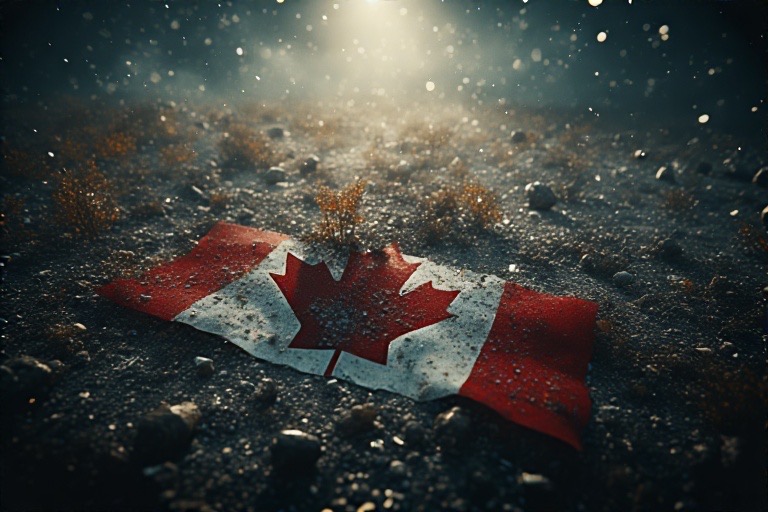The term “Failed State” conjures a narrow set of ideas in most people’s minds. Generally, one probably pictures a post-apocalyptic hellscape where there is no law and order, no governing authority, just warlords and bandits running around à la Walking Dead, sans zombies.
To provide a slightly more formal definition of what has generally been conceived as a failed state, I am going to borrow from Wikipedia, which I think offers a decent baseline. I am paraphrasing, but the common view would be that a failed state is one that has lost the ability to fulfill fundamental security and development functions, and/or maintain control over its territory and/or borders. With this comes widespread corruption, criminality, involuntary movement of peoples (internally displaced peoples or domestic refugees), economic decline, and the ‘intervention’ of non-state actors (usually defined as insurgents, but I would argue for the discussion I wish to have that organized crime would suffice).
To take a slightly broader view, we would see overwhelming crime rates, which suggest that the state’s police force has been in some way undermined, an impenetrable and ineffective bureaucracy, judicial ineffectiveness, and the consolidation of power by regional actors such that it rivals or eliminates the influence of national authorities. This actually ties into an observation by Joseph Tainter concerning the collapse of complex societies, in which he highlights that there is generally a retreat into smaller spheres of power, so instead of large nations or empires, you end up with regional authorities (or, to take it further, warlords)…smaller jurisdictions is the point.
If we boil it down, what this all really drives at is the idea that the state has become ineffective and is not able to enforce itself uniformly or provide basic goods and services to its citizens.
Generally, I think many minds focus directly on physical security, as opposed to a broader understanding of security. I’m starting to wonder if our understanding of what constitutes a failed state is too narrow. I don’t think it necessarily has to look like Yugoslavia in the 1990s. Nor does it have to be a third-world hellhole like Liberia or Haiti.
I’m honestly starting to think that Canada could be somewhere on the failed state curve and on its way to a place that could arguably be characterized as a failed state. You may scoff, but let’s briefly entertain the idea and examine Canada through that lens using the parameters above.
• Policing, Bail, and Organised Crime.
Canada has created a ‘reformed’ bail system that has accomplished two things. The first is that the courts must now consider a person’s ‘identity’ (read ethnicity) in its application of the law, this is both in terms of bail as well as criminal proceedings. What Canada has in effect done is create an apartheid state, albeit one far milder than South Africa, yet one where your ethnicity determines how the law is applied to you.
This has consequences such a police officer shot and killed by an man who by the judge’s own admission would not have been given bail were it not for his ethnicity. There have been near countless instances of Canadian police forces publicly speaking out against recent bail reforms, which they have clearly demonstrated make it nearly impossible to maintain law and order.
This system has strengthened organised crime in Canada while attracting more organizations from abroad. It is now widely considered (including by CSIS itself) to represent a major national security concern. There is now credible evidence these organisations have begun infiltrating government organisations. This situation is also impacting our relationship with the US.
• Economic decline and the involuntary movement of people (internally displaced people or domestic refugees).
Most Canadians know someone or are aware of the phenomenon of Canadians (particularly young Canadians) forced to move across the country for jobs. There was a rush of Newfoundlanders to Fort Mac; more recently, many Ontarians have relocated to the East Coast in search of more affordable homes. I would argue this represents a form of involuntary (or near-involuntary) movement in response to economic decline.
As far as economic decline is concerned, what else do you call it when people in one of the richest economies in the world can’t afford a home? Among the G7, Canada ranks in last place on most metrics when one considers the false economic growth created by mass immigration, which is both unsustainable and driving concerns about cost and quality of life. The RCMP has already warned that there is a major risk of revolt associated with the housing crisis. The OECD doesn’t hold much hope for Canada’s future trajectory. There is a reason the Banks are now using the term “lost decade.”
• Impenetrable and ineffective bureaucracy, and some corruption.
The public service has famously/infamously exploded in the last decade. Its growth has far outpaced population growth, and yet the result has not been a noticeable improvement in Government output. In fact, we have also seen a massive expansion of private consultant contracts during the same period, now known as a ‘consultocracy’. More concerning is that the Auditor General has found that since 2011, about 70% of these have been non-competitive. Transparency has long been an issue.
What do you call it when one of the greatest reserves of natural resources in the world can’t function coherently enough to get those resources to market?
One has to ask, if Trudeau banned guns with an order in council, end handguns refusing to issue legally requested import licenses for what were still legal handguns, if Carney zeroed the carbon tax with what was essentially an expression of intent (or whatever they call it), Why is it going to take the Carney Government two years to ‘fast-track’ new energy infrastructure projects that they claim are critical to the national interest in what they also claim is a period of what is essentially a national emergency?
Beyond that is the corruption. One glaring example would be the Doug Ford Greenbelt ‘controversy’ that did not lead to criminal prosecution despite being obvious to everyone what was going on. At the Federal level, issues like the SNC-Lavalin affair and those involving Mary Ng were just the tip of a very big and very old iceberg that reaches back into the sponsorship scandal. The Harper era, long forgotten by the overwhelming power of the Trudeau stink, was equally deplorable. Accountability is not within the capacity of the Canadian Government to enforce.
• The consolidation of power by regional actors that rivals the influence of national authorities.
Quebec unilaterally rewrote the Constitution Act through Bill 96. Despite considerable concern about both its legality (violating sections 38,43, and 45) and the obvious threat to English speakers’ rights in Quebec, the Trudeau Government failed to challenge this to test its legality. It has instead ceded the point and authority while setting a dangerous precedent. It appears to now face a challenge at the United Nations due to the Canadian Government’s reluctance or inability to confront the issue.
Quebec and Alberta both have genuine separatist movements (however ridiculous you and I may think they are). Alberta has directed the RCMP not to use provincial resources to enforce unpopular and ineffectual federal firearms bans and stated the province will not participate. Alberta has also begun investigating the creation a provincial police force to remove the RCMP from the province. As a bonus, one could also point to various protest movements from ‘Idle No More’ to the ‘Freedom Convoy’, or more recently, even Palestinian protests that paralyze this country, which the Government seems unable to police or at least extremely apprehensive about confronting.
• Maintain control over territory, borders and fulfill fundamental security and development functions.
Some elements of this have come through in previous sections. That said, security isn’t just physical, it’s economic and social. Rising crime, financial instability, social upheaval from mass immigration, the housing crisis, and banking uncertainty are all security failures. Canadian distrust of the state is at an all-time high and growing, a fact the government is painfully aware of.
The CAF has acknowledged it is barely functional. A leaked readiness report revealed that roughly half of all vehicles are unserviceable. Recruitment is in crisis, and Canada lacks the ability to defend its own borders. One example is the Chinese Balloon that the U.S. shot down after it crossed Canadian airspace. A more concrete example would be Canada’s inability to patrol its own Arctic. New arctic patrol ships lack range, and Canada still doesn’t have a functioning base there. Canada is now rushing to build long-overdue capabilities, repeating a pattern of delayed urgency that defines Canadian politics.
On another front, the Government has begun walking back the huge numbers of visa holders who have been allowed into Canada by simply allowing their visas to expire without renewing them. When challenged on how exit controls would be enforced, the Government’s Minister for Immigration admitted it did not have the necessary resources and that it would be relying on the goodwill of those with expired visas to leave of their own accord. Additionally, the attempt at recent crackdowns revealed over 700 students from India who had entered and operated in Canada on fake visas that were somehow missed.
Finally, there is the question of free and fair elections and the Foreign Interference scandal. An issue that the Government had to be dragged, kicking and screaming, to acknowledge and investigate after numerous CSIS leaks and widespread public outrage. The entire, long-drawn-out process, from the CSIS leaks to the special rapporteur to the Hogue Commission, is itself pretty damning. Its findings are even more so.
All of this is to say that it seems Canada’s various ‘experiments’ in everything from our form of democracy (major urban-rural divides), to federal-provincial relationships, to crime and punishment, to natural resource management, to immigration and multiculturalism, have all failed or are failing. After a conversation with our Editor-in-Chief, Stewart Webb, this morning, I noted that it’s challenging to understand how certain things can be accomplished so quickly while others of equal or greater importance seem to stall. I offhandedly remarked that I was starting to wonder if our understanding of what constitutes a failed state is too narrow, and that I was honestly starting to think Canada is, or could be, on its way to a place that could arguably be characterized as failed.
I don’t like political sloganeering, and although I don’t disagree with many Conservative policy positions (many now adopted by the Carney Liberals), I don’t trust Pierre Poilievre. That said, he is correct, Canada is definitely broken. I don’t see anything to suggest that this country is anywhere near to genuinely acknowledging the problem, or how deep it is, let alone actually taking (or even being able to take) the actions required to right the ship. Instead, this may be a pessimistic view on my part, but I do think that moving forward, you will hear people less extreme than me start to refer to Canada in terms of a failed or near-failed state.
I realize that upon hearing this assertion, the instinct will be to scoff and dismiss it as absurd. However, if you expand how you view or define ‘failed state’ ever so slightly, it becomes clear this is really just a question of degrees and that should scare the hell out of all of us.


